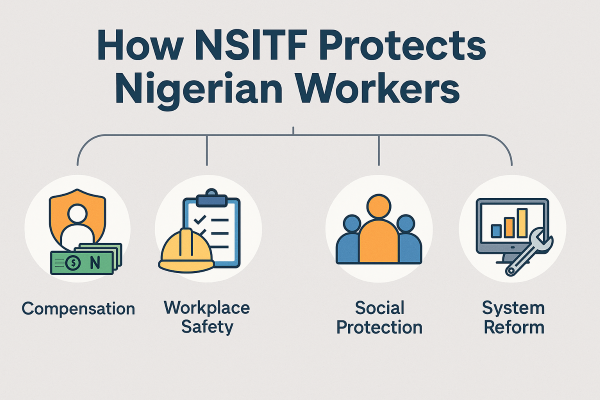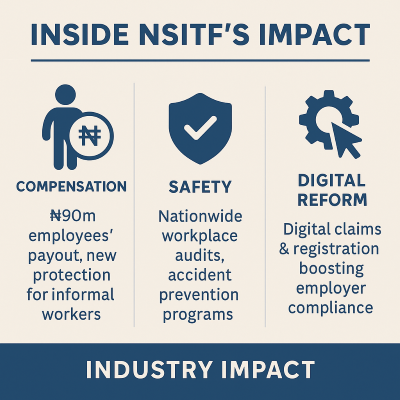NSITF’s New Drive to Secure Nigerian Workers: ₦90m Paid to Seplat Staff, Reforms to Protect Millions

The Nigeria Social Insurance Trust Fund (NSITF) has entered a transformative era, marking a bold stride in social protection, workplace safety, and labour welfare reform across Nigeria.
Through its Employees’ Compensation Scheme (ECS), the Fund has disbursed multi-million-naira compensation to employees of leading firms — including ₦90 million to a Seplat Energy worker, ₦30 million to a Nestlé employee, and ₦17 million to a MedPlus staff — signalling renewed operational efficiency and a deepened commitment to workforce security.

“These figures are not just data; they represent lives rebuilt and families restored,” said Mr. Oluwaseun Faleye, Managing Director of the NSITF.
A Stronger Safety Net for Nigeria’s Workforce
Established under the Employees’ Compensation Act (ECA) 2010, the ECS provides mandatory coverage for work-related injuries, diseases, disabilities, or fatalities — ensuring no Nigerian worker is left unprotected.
Employers across the public and private sectors are required to register and contribute to the Employee Compensation Fund managed by NSITF.
Faleye noted that claims processing rose by 56% in 2025, compared to the previous year — an indicator of operational reform and improved transparency.
“Our objective is to ensure workers’ welfare remains at the heart of industrial productivity,” he stated.

From Payouts to Prevention: Promoting Workplace Safety
Beyond compensations, the Fund’s focus is shifting towards prevention over cure.
Through its flagship Safe Workplace Intervention Programme (SWIP) — jointly implemented with the Nigeria Employers’ Consultative Association (NECA) — the Fund has intensified occupational safety audits and nationwide campaigns on factory safety, hazard identification, and employee well-being.
“Every accident prevented is a family protected and a life preserved,” Faleye stressed.
NSITF also collaborates with the Institute of Safety Professionals of Nigeria (ISPON) and the Federal Ministry of Labour and Employment to embed a safety-first culture in workplaces.
Digital Transformation and Governance Reform
In a bid to overcome legacy inefficiencies, the Fund is digitalising its claims, registration, and compliance systems.
The new online portal enables real-time employer registration and automated claims tracking — reducing processing time and human error.
Faleye, however, lamented under-declaration of salaries and workforce sizes by some employers.
“When employers falsify payroll data, they weaken the safety net meant to protect their workers,” he warned.
He urged companies to embrace transparency, noting that fair declarations ensure workers receive their rightful benefits under the ECS.
Customised Social Insurance for the Informal Economy
Recognising that 70% of Nigeria’s workforce operates in the informal sector, NSITF has launched a customised social protection framework targeting artisans, traders, and small business operators.
The initiative adopts an association-led model, working through cooperatives, market unions, and industry associations to register informal workers.
“Our goal is to extend protection to those outside the formal payroll — the engine of Nigeria’s productivity,” Faleye explained.
The scheme, aligned with President Bola Tinubu’s Renewed Hope Agenda, integrates financial inclusion, micro-contribution plans, and access to rehabilitation for injury-prone occupations.
Rehabilitation and Reintegration: Restoring Dignity
For injured or disabled workers, NSITF offers rehabilitation services, prosthetics, vocational training, and reintegration grants.
The approach ensures that workplace injuries do not become permanent barriers to productivity.
“Compensation restores livelihoods, but rehabilitation restores dignity,” Faleye said.
These programs reflect international labour standards under ILO Convention 102, reinforcing Nigeria’s alignment with global best practices.
Legislative Reforms and Stakeholder Tensions
The ongoing amendment to the NSITF Establishment Act, currently before the Senate, aims to strengthen enforcement powers and governance. However, unions such as the Nigeria Labour Congress (NLC) have warned against amendments that might dilute the Fund’s tripartite structure by reducing employer and worker representation.
Industry observers argue that maintaining balanced stakeholder governance is crucial for preserving NSITF’s transparency and accountability.
“The Fund’s future lies in finding harmony between government oversight and stakeholder autonomy,” Faleye emphasized.
BRANDECONOMY ANALYSIS
The Nigeria Social Insurance Trust Fund is evolving from a reactive compensation institution to a strategic pillar of Nigeria’s socio-economic resilience. Its impact transcends payouts — it is redefining how social protection contributes to national productivity.
BRANDECONOMY analysis identifies three key strategic imperatives shaping NSITF’s transformation:
- Institutional Credibility:
By increasing transparency in claims and compensation, the Fund is rebuilding public confidence in Nigeria’s social protection system. This credibility is essential for sustained employer compliance and long-term solvency. - Integration of the Informal Sector:
NSITF’s new inclusion strategy is a potential game-changer. If effectively executed, it could bring over 50 million informal workers into Nigeria’s formal social insurance net — a monumental step towards financial inclusion and equitable growth. - Digital Transformation and Compliance Reform:
The Fund’s migration from manual to digital systems will enhance auditability, efficiency, and responsiveness. However, success depends on consistent funding, staff retraining, and strict compliance enforcement.
In a broader context, NSITF’s success could reposition Nigeria as a continental model for integrated social protection and workforce insurance — aligning with the African Union’s Agenda 2063 goals for decent work, inclusion, and social justice.
Conclusion
Under Mr. Oluwaseun Faleye’s leadership, the NSITF is laying the foundation for a modern, data-driven, and inclusive social insurance ecosystem — one that not only cushions economic shocks but also strengthens the dignity of labour.
For millions of Nigerian workers, the Fund is becoming more than an institution; it is an economic lifeline and a symbol of a fairer, safer future.












